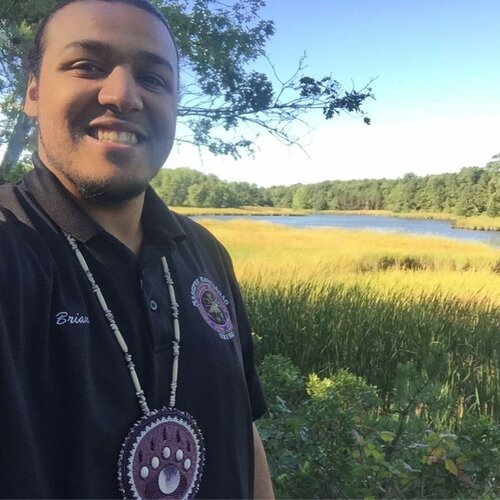One week after pleading not guilty to two criminal theft charges, Mashpee Wampanoag Tribal Chairman Brian Weeden returned to work today amid a show of support from the Tribe.

Chairman Weeden, 30, had been on paid leave since early December 2022, when he was identified as a suspect in the theft of cultural items from the Plimoth Patuxet Museums in Plymouth, Mass. He was charged with breaking and entering and felony larceny of more than $1,200, according to Plymouth District Court.
Weeden pleaded not guilty to the charges in Plymouth District Court on Jan. 5.
At a tribal council meeting last night—the final day of Weeden’s paid leave—tribal council members discussed the situation with their chairman, according to the tribal spokesperson, Steven Peters.
In a statement provided to Native News Online, the Mashpee Wampanoag Tribal Council said the following regarding Weeden’s return from the leave: “Brian Weeden was elected Chairman in 2021 and has served his people in that capacity continuously since his election. Chairman Weeden has worked effectively for his people securing land in trust, a record amount of grant funding, and strengthening our cultural ties and economic development for future generations. The Mashpee Wampanoag Tribe stands united with our Chairman and Tribal Council.”
On Dec. 15, the council wrote in a statement that they regard the charges against Weeden as “a personal matter to be resolved by the courts.”
More Stories Like This
Native News Weekly (August 25, 2024): D.C. BriefsUS Presidents in Their Own Words Concerning American Indians
Navajo Mother Welcomes Federal Charges in 2020 Killing of Her Son
Native News Online Launches Year-End Campaign to Support ‘Warrior Journalism’
Native News Online’s Year-End Live Stream - Recap of 2025: A Night That Brings Indian Country Together
Help us defend tribal sovereignty.
At Native News Online, our mission is rooted in telling the stories that strengthen sovereignty and uplift Indigenous voices — not just at year’s end, but every single day.
Because of your generosity last year, we were able to keep our reporters on the ground in tribal communities, at national gatherings and in the halls of Congress — covering the issues that matter most to Indian Country: sovereignty, culture, education, health and economic opportunity.
That support sustained us through a tough year in 2025. Now, as we look to the year ahead, we need your help right now to ensure warrior journalism remains strong — reporting that defends tribal sovereignty, amplifies Native truth, and holds power accountable.
 The stakes couldn't be higher. Your support keeps Native voices heard, Native stories told and Native sovereignty defended.
The stakes couldn't be higher. Your support keeps Native voices heard, Native stories told and Native sovereignty defended.
Stand with Warrior Journalism today.
Levi Rickert (Potawatomi), Editor & Publisher


